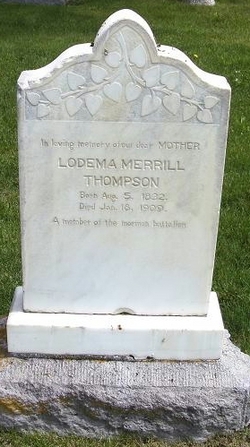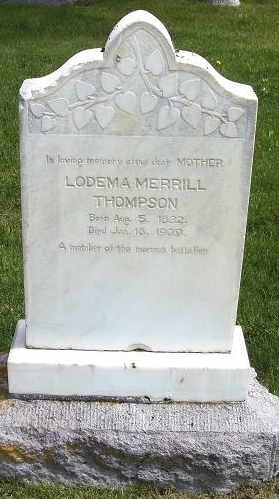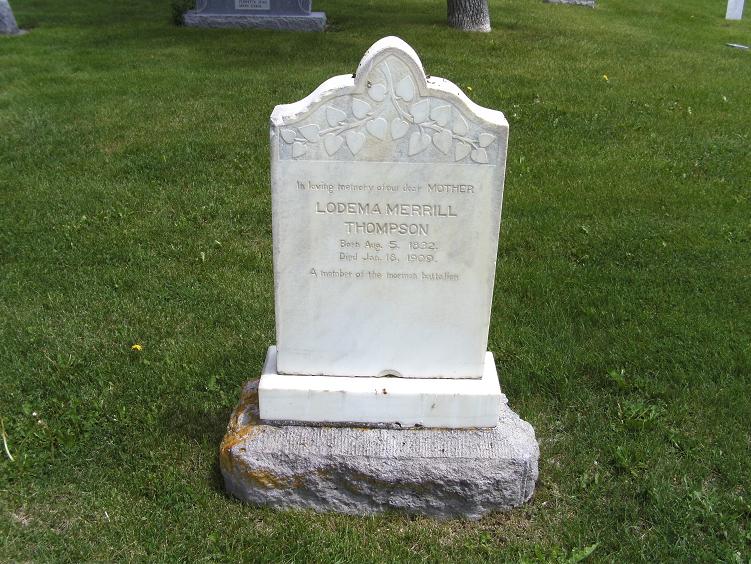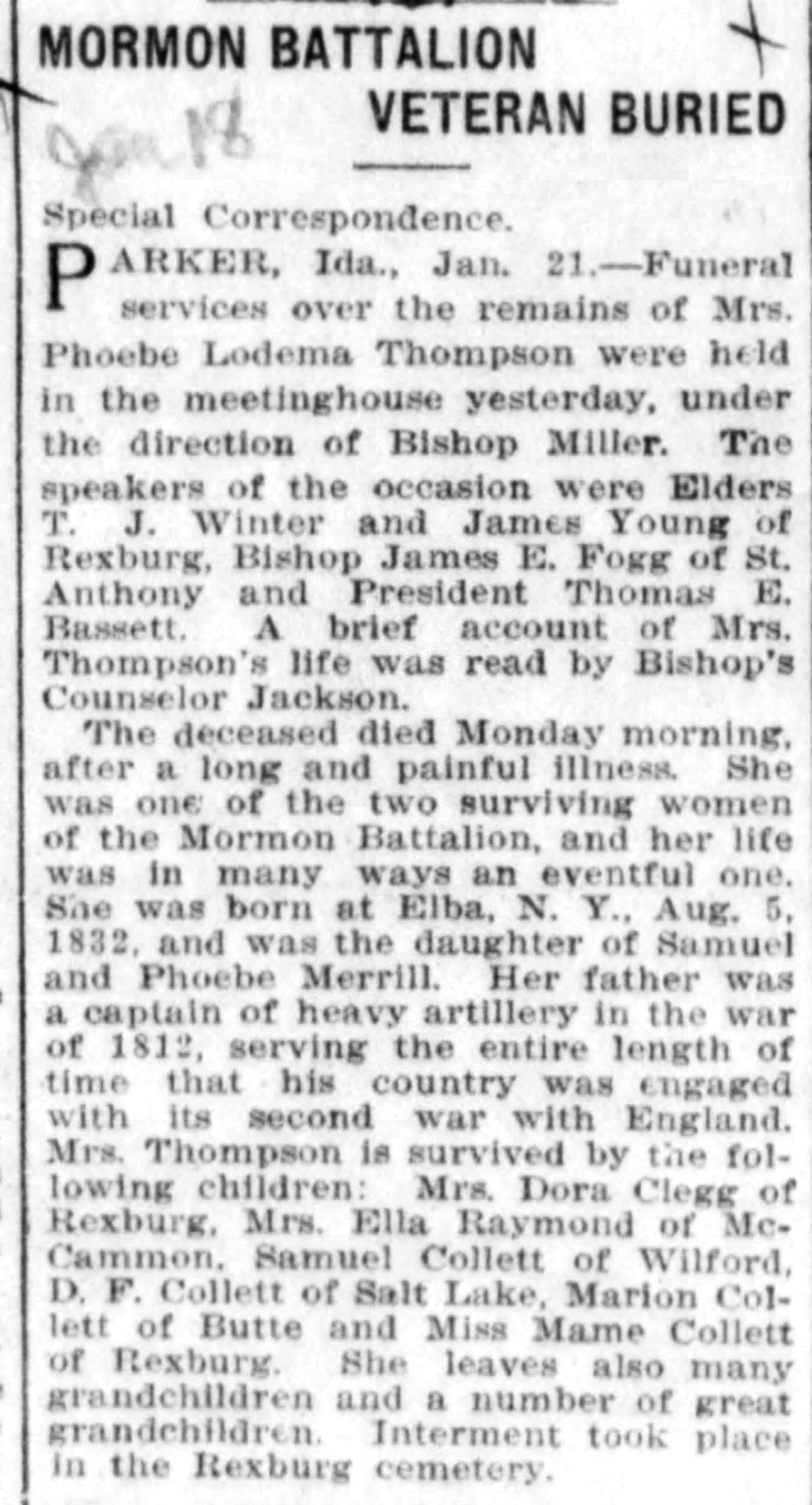Married Parmenio Adams Jackman, 16 Oct 1851, Salt Lake City, Utah
Married Sylvenus Collet, 1864
Married William Thompson
Latter-day Saint Biographical Encyclopedia Volume 4
Merrill (Thompson), Phoebe Lodema, who accompanied the Mormon Battalion as a nurse, was born Aug. 5, 1832, in Elba, New York, a daughter of Samuel and Phoebe Merrill. As a child, she was with her parents during the exodus from Nauvoo, and went with the Battlion as a nurse in the company in which her brother, Philemon C. Merrill, served as adjutant. From Santa Fe she was sent with the sick detachment and the women and children to Pueblo, where they spent the winter of 1846-1847. She married Parmenio A. Jackman in 1851, who was killed by the Indians in 1860; she later married a man by the name of Thompson. She died Jan. 18, 1909, in Parker, Idaho.
The Merrill Sisters
Heart Throbs of the West, Kate B. Carter, Vol.2, p.72
Samuel Merrill was a veteran of the war of 1812, and as a soldier, was on hand to encourage the boys of the Mormon Battalion to do all in their power to help the United States in their war with Mexico. Of his family, one son, Philemon C. Merrill, two sons-in-law, Philander Colton and Thomas S. Williams, two grandsons, Edwin Colton and Ferdinand Merrill, and two daughters, Albina Merrill Williams and Phoebe Lodema, who later became the wife of Paremnio Jackman, joined the Battalion.
Both of these sisters were born in Elba, New York, and when Mr. Williams enlisted in the Battalion, his wife decided to go with him and take her younger sister with her. Mrs. Williams also had two small children, Ephraim and Caroline, and while in Pueblo, gave birth to a daughter whom she called Phebe. The following is taken from her biography:
"It was late in the fall of 1846, and Captain Brown determined to winter in the Spanish fort (Pueblo). It was hundreds of miles from any settlement, and poorly protected, but it was the best refuge that could be obtained. The men who were able to work set about strengthening the fortifications, as Indians and Spaniards were almost daily threatening attacks upon the fort. Insufficient food and clothing occasioned much sickness among men, women and children. The number of graves in the little cemetery gradually increased as the population of the place decreased and, but for the tender nursing of the women of the camp, many more would have been added to the city of the silent dead. Spring came at last and then the word was conveyed to the isolated little colony that a start had been made by the pioneers at Council Bluffs to find a new home in the far west. No time was lost in bidding farewell to the old fort on the Arkansas. Captain Brown's Company fell in the wake of the pioneers and all but overtook them before the Valley of the Great Salt Lake was reached. As a matter of fact, some of the Battalion people came in with the pioneers, but the wagon containing Mrs. Williams and her sister did not arrive on the banks of City Creek until five days after President Young had pitched his tent there. Early in their married life, these two women were left widows. In the spring of 1860, Mr. Williams and Mr. Jackman took a southern route for California to bring back a load of merchandise. They had a large number of wagons drawn by forty span of mules and several teamsters. As they reached Bitter Springs, they were ahead of their caravan, and were attacked and shot down by Redskins. The Indians, an old man and his three sons, appeared friendly and the unsuspecting white men allowed them to fall into the rear of them when they were shot in the backs by arrows. Mr. Jackman was thought to be dead when Mr. Williams, seriously injured, went to convey the news to their men. As he went along, he tried to pull an arrow from his back, but the point was broken off inside of him. He died that night. When found, Mr. Jackman was alive, but had been terribly tortured by the Indians. He lived one month, and is buried in San Bernardino."
Phoebe Lodema Merrill, also went with the Battalion and served as a nurse. (She was later the wife of Parmenio Adams Jackman)
It should be noted that this first family was very obedient to the prophet. They sent one son- Philemon C. Merrill, two sons-in-law-- Philander Colton and Thomas S. Williams, two grand-sons--Edwin Colton and Ferdinand Merrill,and two daughters-- Albina, and Phoebe Lodema with the Mormon Battalion. Eventually Albina and Thomas, along with their children and Albina's sister Phoebe, were sent back with the James Brown Detachment in October 1846, to Pueblo, Colorado. While spending the time there, Albina gave birth to a daughter on January 15, 1847. They named her Phoebe Isabell. The following is taken from Albina's biography.
"It was late in the fall of 1846, and Captain Brown determined to winter in the Spanish fort (Pueblo). It was hundreds of miles from any settlement, and poorly protected but it was the best refuge that could be obtained.
"The men, who were able to work, set about strengthening the fortifications, as Indians and Spaniards were almost daily threatening attacks upon the fort. Insufficient food and clothing occasioned much sickness, among men, women, and children. The number of graves in the little cemetery increased as the population of the place decreased and, but for the tender nursing of the women of the camp, many more would have been added to the city of the silent dead."
Spring came and then the word was sent to the isolated little colony for them to start for the Rocky Mountains. They lost no time in bidding the little fort on the Arkansas a "goodbye". The Williams family arrived at the banks of City Creek in the Salk Lake Valley on July 29, 1847. In 1851, Phoebe Lodema Merrill, sister of Albina, became the wife of Parmenia A. Jackman. A few years later Parmenio and Thomas, his brother-in-law, engaged in a freighting business venture. In time, this business became one of the most prosperous in the city. In 1860, Thomas and Parmenio went to California to bring back a wagon train and merchandise. They had several wagons drawn by 40 spans of mules and they employed many teamsters. Near Bitter Springs on March 18th, the two men were shot down by Indians as they rode in advance of their wagons to look for a suitable place to camp. The Indians, an old man and his three sons, appeared friendly and told of good grass and water just ahead. The unsuspecting white men allowed the redskins to fall into the rear, when suddenly each rider was pieced by two arrows in the back. Mr. Jackman fell face down in the sand and Thomas thought him to be dead. Thomas galloped away and reached his men while yet enough life remained in him to tell the story. As he rode along he tried to pull one of the arrows from his back and the point was broken off inside him. He died that night. When found, Mr. Jackman was still alive but had been tortured by the Indians. He was paralyzed and unable to help himself in any way, except to reach a five-shooter pistol in his pocket. Four barrels had been emptied at the Indians, while the fifth was retained to put an end to his own suffering in case the Indians attacked again. He lived one month to the day. He was buried in San Bernardino, California. Of the entire, outfit, only one pair of mules was returned to the widows. The teamsters appropriated, for themselves, the remainder of the animals and the valuable outfits. The murdered merchants had much valuable real estate in the city, but the affairs, consequent upon the men's tragic death, reduced the windows from affluence to almost poverty.
Later Mrs. Jackman remarried, but Mrs. William remained a widow until her death. Albina died on November 28, 1914, in Pocatello, Idaho. She was the mother of ten children. After the death of her husband, Phoebe Lodema Merrill Jackman married Sylvenus Collett. Upon his death she married William Thompson. She, at some time, moved to Rexburg, Idaho and died there on January 18, 1909, and is buried in the Rexburg, Idaho cemetery with her husband, William Thompson.
Caroline Marie Williams, a daughters of Thomas and Albina, who went with them on the Battalion march, was born on April 24, 1843, in Nauvoo, Illinois. She married David Patten Kimball in 1857. They moved to Thatcher, Arizona, where she died on December 21, 1916, and was buried at St. David, Arizona. She was the mother of ten children.
Phoebe Isabell Williams, a daughter of Thomas and Albina, was born in Pueblo, Colorado on January 15, 1847. She married Thomas Hugh Doran or Dorrien about 1864. She died in November of 1880 in Salt Lake City, Utah. She was the mother of two children, Caroline Marion and Hugh Thomas.
Mormon Battalion members
Married Parmenio Adams Jackman, 16 Oct 1851, Salt Lake City, Utah
Married Sylvenus Collet, 1864
Married William Thompson
Latter-day Saint Biographical Encyclopedia Volume 4
Merrill (Thompson), Phoebe Lodema, who accompanied the Mormon Battalion as a nurse, was born Aug. 5, 1832, in Elba, New York, a daughter of Samuel and Phoebe Merrill. As a child, she was with her parents during the exodus from Nauvoo, and went with the Battlion as a nurse in the company in which her brother, Philemon C. Merrill, served as adjutant. From Santa Fe she was sent with the sick detachment and the women and children to Pueblo, where they spent the winter of 1846-1847. She married Parmenio A. Jackman in 1851, who was killed by the Indians in 1860; she later married a man by the name of Thompson. She died Jan. 18, 1909, in Parker, Idaho.
The Merrill Sisters
Heart Throbs of the West, Kate B. Carter, Vol.2, p.72
Samuel Merrill was a veteran of the war of 1812, and as a soldier, was on hand to encourage the boys of the Mormon Battalion to do all in their power to help the United States in their war with Mexico. Of his family, one son, Philemon C. Merrill, two sons-in-law, Philander Colton and Thomas S. Williams, two grandsons, Edwin Colton and Ferdinand Merrill, and two daughters, Albina Merrill Williams and Phoebe Lodema, who later became the wife of Paremnio Jackman, joined the Battalion.
Both of these sisters were born in Elba, New York, and when Mr. Williams enlisted in the Battalion, his wife decided to go with him and take her younger sister with her. Mrs. Williams also had two small children, Ephraim and Caroline, and while in Pueblo, gave birth to a daughter whom she called Phebe. The following is taken from her biography:
"It was late in the fall of 1846, and Captain Brown determined to winter in the Spanish fort (Pueblo). It was hundreds of miles from any settlement, and poorly protected, but it was the best refuge that could be obtained. The men who were able to work set about strengthening the fortifications, as Indians and Spaniards were almost daily threatening attacks upon the fort. Insufficient food and clothing occasioned much sickness among men, women and children. The number of graves in the little cemetery gradually increased as the population of the place decreased and, but for the tender nursing of the women of the camp, many more would have been added to the city of the silent dead. Spring came at last and then the word was conveyed to the isolated little colony that a start had been made by the pioneers at Council Bluffs to find a new home in the far west. No time was lost in bidding farewell to the old fort on the Arkansas. Captain Brown's Company fell in the wake of the pioneers and all but overtook them before the Valley of the Great Salt Lake was reached. As a matter of fact, some of the Battalion people came in with the pioneers, but the wagon containing Mrs. Williams and her sister did not arrive on the banks of City Creek until five days after President Young had pitched his tent there. Early in their married life, these two women were left widows. In the spring of 1860, Mr. Williams and Mr. Jackman took a southern route for California to bring back a load of merchandise. They had a large number of wagons drawn by forty span of mules and several teamsters. As they reached Bitter Springs, they were ahead of their caravan, and were attacked and shot down by Redskins. The Indians, an old man and his three sons, appeared friendly and the unsuspecting white men allowed them to fall into the rear of them when they were shot in the backs by arrows. Mr. Jackman was thought to be dead when Mr. Williams, seriously injured, went to convey the news to their men. As he went along, he tried to pull an arrow from his back, but the point was broken off inside of him. He died that night. When found, Mr. Jackman was alive, but had been terribly tortured by the Indians. He lived one month, and is buried in San Bernardino."
Phoebe Lodema Merrill, also went with the Battalion and served as a nurse. (She was later the wife of Parmenio Adams Jackman)
It should be noted that this first family was very obedient to the prophet. They sent one son- Philemon C. Merrill, two sons-in-law-- Philander Colton and Thomas S. Williams, two grand-sons--Edwin Colton and Ferdinand Merrill,and two daughters-- Albina, and Phoebe Lodema with the Mormon Battalion. Eventually Albina and Thomas, along with their children and Albina's sister Phoebe, were sent back with the James Brown Detachment in October 1846, to Pueblo, Colorado. While spending the time there, Albina gave birth to a daughter on January 15, 1847. They named her Phoebe Isabell. The following is taken from Albina's biography.
"It was late in the fall of 1846, and Captain Brown determined to winter in the Spanish fort (Pueblo). It was hundreds of miles from any settlement, and poorly protected but it was the best refuge that could be obtained.
"The men, who were able to work, set about strengthening the fortifications, as Indians and Spaniards were almost daily threatening attacks upon the fort. Insufficient food and clothing occasioned much sickness, among men, women, and children. The number of graves in the little cemetery increased as the population of the place decreased and, but for the tender nursing of the women of the camp, many more would have been added to the city of the silent dead."
Spring came and then the word was sent to the isolated little colony for them to start for the Rocky Mountains. They lost no time in bidding the little fort on the Arkansas a "goodbye". The Williams family arrived at the banks of City Creek in the Salk Lake Valley on July 29, 1847. In 1851, Phoebe Lodema Merrill, sister of Albina, became the wife of Parmenia A. Jackman. A few years later Parmenio and Thomas, his brother-in-law, engaged in a freighting business venture. In time, this business became one of the most prosperous in the city. In 1860, Thomas and Parmenio went to California to bring back a wagon train and merchandise. They had several wagons drawn by 40 spans of mules and they employed many teamsters. Near Bitter Springs on March 18th, the two men were shot down by Indians as they rode in advance of their wagons to look for a suitable place to camp. The Indians, an old man and his three sons, appeared friendly and told of good grass and water just ahead. The unsuspecting white men allowed the redskins to fall into the rear, when suddenly each rider was pieced by two arrows in the back. Mr. Jackman fell face down in the sand and Thomas thought him to be dead. Thomas galloped away and reached his men while yet enough life remained in him to tell the story. As he rode along he tried to pull one of the arrows from his back and the point was broken off inside him. He died that night. When found, Mr. Jackman was still alive but had been tortured by the Indians. He was paralyzed and unable to help himself in any way, except to reach a five-shooter pistol in his pocket. Four barrels had been emptied at the Indians, while the fifth was retained to put an end to his own suffering in case the Indians attacked again. He lived one month to the day. He was buried in San Bernardino, California. Of the entire, outfit, only one pair of mules was returned to the widows. The teamsters appropriated, for themselves, the remainder of the animals and the valuable outfits. The murdered merchants had much valuable real estate in the city, but the affairs, consequent upon the men's tragic death, reduced the windows from affluence to almost poverty.
Later Mrs. Jackman remarried, but Mrs. William remained a widow until her death. Albina died on November 28, 1914, in Pocatello, Idaho. She was the mother of ten children. After the death of her husband, Phoebe Lodema Merrill Jackman married Sylvenus Collett. Upon his death she married William Thompson. She, at some time, moved to Rexburg, Idaho and died there on January 18, 1909, and is buried in the Rexburg, Idaho cemetery with her husband, William Thompson.
Caroline Marie Williams, a daughters of Thomas and Albina, who went with them on the Battalion march, was born on April 24, 1843, in Nauvoo, Illinois. She married David Patten Kimball in 1857. They moved to Thatcher, Arizona, where she died on December 21, 1916, and was buried at St. David, Arizona. She was the mother of ten children.
Phoebe Isabell Williams, a daughter of Thomas and Albina, was born in Pueblo, Colorado on January 15, 1847. She married Thomas Hugh Doran or Dorrien about 1864. She died in November of 1880 in Salt Lake City, Utah. She was the mother of two children, Caroline Marion and Hugh Thomas.
Mormon Battalion members
Family Members
-
![]()
Parmenio Adams Jackman Jr
1852–1908
-
Madora Catherine Lodema Jackman Clegg
1855–1913
-
Flora Albina Jackman
1857–1857
-
Robert Jackman
1859 – unknown
-
![]()
Luella Ione "Ella" Jackman Raymond
1860–1920
-
![]()
Samuel Merrill Collett
1865–1929
-
Louisa Thompson
1866 – unknown
-
Daniel Francello Collett
1867–1930
-
![]()
Marion Merrill Collett
1870–1935
-
![]()
Mary Merrill "Aunty Mayme" Collett
1870–1950
Sponsored by Ancestry
Advertisement
Records on Ancestry
Sponsored by Ancestry
Advertisement
























